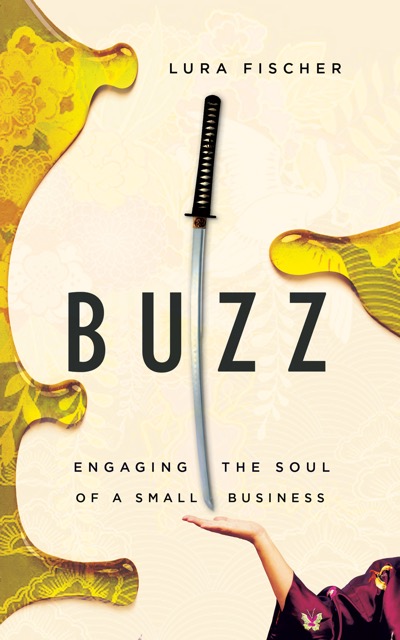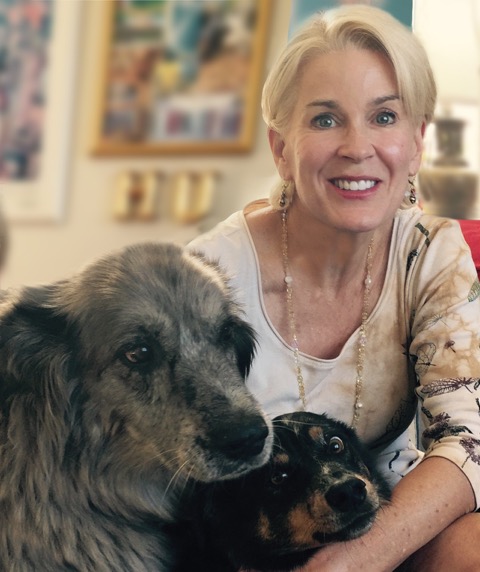When businesswoman Lura Fischer joined my online book-structuring
class a few years ago, she told me she wanted to write a business
fiction book. I didn't know that much about this new genre, but I
watched Lura build her story over the months we worked together. This
month, her new novel, Buzz, was released and rose quickly to #1 on the amazon Women in Business category.
Buzz is a novel about "a relentlessly principled
young businesswoman" who is "facing ominous threats to both the life of
her business and to herself." In classic storytelling, Lura places us
in the business world of Taki Fujimori. Taki "must draw on her samurai
heritage to battle nefarious forces in the workplace and save her young
company from dying," Lura says about the book. "At the same time, a
500-year flood threatens to sweep her away into oblivion." Taki is also
on a quest to piece together her family's past.
Taki's core values for both her life and her business are "vitality,
genius, and heart," Lura told me. She weaves business strategies and
management tools into the story, so the book can teach as well as
entertain with its compelling story.
I interview Lura for this blog post. Here's her journey to
publication in her own words, and the interesting story about business
fiction, a rising new genre.
 Q: Can you share your definition of business
fiction--what is it, how does it differ from other kinds of fiction, and
who is the primary audience?
Q: Can you share your definition of business
fiction--what is it, how does it differ from other kinds of fiction, and
who is the primary audience?
Q: Why did you want to write a business fiction book?
Q: When did you start writing it? How long did it take?

LF: Business fiction features a fictional
story with dilemma, characters, and container, like other fiction, plus
it has embedded business concepts throughout the narrative. Business
fiction has a dual responsibility, to both inform and entertain--and,
when done well, inspire its readers. My intention was to tell a unique
story, composed of vitality, genius, and heart - the same core values I
espouse through my relentlessly principled protagonist in Buzz.
If you look at the Business and Money category on Amazon,
there are a myriad of subtitles under that genre. I focused on two
categories: Women in Business, and Entrepreneurship & Small
Business. My focus, when writing this book, was on the millennial
businesswoman. I wanted to reach out to the young business owner and
tell a fantastical story, while also offering vetted business tools and
practical solutions to everyday challenges. So far, more men have read
the book than women, based on my Amazon reviews! I really love that,
because I think men are just as hungry for meaning and relevancy as
women are in business. And our brains are wired for stories, so it’s
more palatable to absorb principles written in story-form format--sort
of like gobbling up a yummy birthday cake, loaded inside with
bright-colored fruits and veggies.
Q: Why did you want to write a business fiction book?
LF: I was inspired by my husband’s business/suspense fiction book, written ten years ago (Navigating the Growth Curve,
by James Fischer). I loosely collaborated with him on it, and suggested
he use a pair of Japanese-American twins as support characters for his
book. Ironically, I redeployed the same twins in mine. Although I have a
business background as a commercial lender and an entrepreneur, along
with my husband, he is the guru. I’m more like the guru’s muse.
Inspiration is my best friend on the playground of life. I realized I
might as well tackle something really big and scary because of such a
stalwart friend. And, personally, I liked the dimensionality of a story
layered with business concepts, sprinkled with Zen stuff, and having a
glistening dollop of romance up on top. How fun is that? Adding a little
love, to enliven business-as-usual, has been such a meaningful mission
in writing this book.
Q: When did you start writing it? How long did it take?
LF: I started writing Buzz
about 3 years ago. Up until that point, I had written extensive loan
summaries on bank clients--striving to bring a client to life, as much
as possible. In fact, I was sometimes too creative and my boss would
roll his, or her, eyes at my desire to go beyond the numbers and tell a
rousing story. I imagined myself around a campfire, regaling bank
executives, but that’s not a venue for storytelling! I finally found my
calling, and your online classes, Mary. They helped me foment this
unbridled desire to write into a digital and print reality. What a
journey our book takes us on!
 |
| Author of Buzz, Lura Fischer |
Q: During the process of writing the book, did it change a lot or did your original vision for it stay the same?
LF: Once I vowed to write my business-fiction book, I had a dream. Two momentous things happened in the dream: One, I saw my book represented by a codex. On its vellum pages, I saw both text and concentric symbols in medallions, dotting the pages (similar to the Phaistos Disk, from the Ancient History Encyclopedia). I knew intuitively my book would house disparate story elements, some mystical, which would ultimately provide my heroine’s symbolic journey, about good prevailing over malicious-ignorance in the workplace. Two, an actual explosion occurred in my brain, and I inwardly saw a blinding light flash across its curving interior---like a light-wave tsunami within my skull! So my vision for my book was granularly embedded within me. I had little recourse, then, but to try and ferret out what was encoded there and write it down, as best I could, over the course of my book’s developmental life.
LF: I’ve learned that taking a risk,
writing the book I envisioned, as wonky as it seemed at times, gave me
creative confidence. That confidence fueled my passion and ignited my
purpose. The more risks I take creatively, the more I come alive, both
on and off the page.
I downloaded my book on Kindle Direct Publishing this past
Veteran’s Day and, one week later, I offered a free-purchase day to the
public. My book is number one (#1!), in both the Women in Business and
the Small Business categories today. It won’t last, but it is so much
fun to see #1 in print, even if only for a day. Big and small wins need
to be celebrated and infused back into our writing.
Additionally, I’ve learned there is the business of writing
your book--- then there is the business of your book being your
business.
Let me provide a few tips I found useful from my brother,
Mark. He decided to write a book because he was sinking in financial
quicksand; he resourcefully grabbed a pen to pull himself out of the
mire and began to write sci-fi novels. He’s written eleven books in over
two years and is a HUGE commercial success. Now, he is brilliantly
imaginative and innately talented (buggah!), but he told me some things
that would help any aspiring writer: Check out books in your genre on
Amazon, or go to Barnes and Noble and feel the weight of a book in your
hand, like yours. Research covers in your genre and hire an artist who
captures the spirit of your book.
Then create a great blurb for your book and vet it with everyone you can, to see if the blurb captures the essence of your book. Hire a developmental editor and a line editor (can be the same person) and don’t rely on friends and/or family to give you the unvarnished truth about what works in your book, and what doesn’t. There are terrific, economical, websites out there, promoting skilled people as your team of experts.
Then create a great blurb for your book and vet it with everyone you can, to see if the blurb captures the essence of your book. Hire a developmental editor and a line editor (can be the same person) and don’t rely on friends and/or family to give you the unvarnished truth about what works in your book, and what doesn’t. There are terrific, economical, websites out there, promoting skilled people as your team of experts.
Q: How are you promoting your book?
LF: I made a deal with Amazon for
exclusivity for a few short months and I am glad I did. Writers have to
decide for themselves how they want to position their book for maximum
exposure.
Sure, I feel like a shameless hussy at times, putting up a Facebook announcement with my book’s ranking (actually a friend helped me with this), or going to promotional websites that advertise your free day to booksellers and readers. As a self-published author, writing the book was the easy part. Sort of like buying a horse for thousands of dollars only to discover its daily ongoing maintenance is mindboggling.
In only one week, I feel like I birthed a gigantic, unwieldy baby, and am now bending over backward to subsidize its college fund. The life of your book is just that--a living thing that needs your attention before, during and after.
After you get your writing team together, get a support team! You’ll need it.
Sure, I feel like a shameless hussy at times, putting up a Facebook announcement with my book’s ranking (actually a friend helped me with this), or going to promotional websites that advertise your free day to booksellers and readers. As a self-published author, writing the book was the easy part. Sort of like buying a horse for thousands of dollars only to discover its daily ongoing maintenance is mindboggling.
In only one week, I feel like I birthed a gigantic, unwieldy baby, and am now bending over backward to subsidize its college fund. The life of your book is just that--a living thing that needs your attention before, during and after.
After you get your writing team together, get a support team! You’ll need it.
Q: What would you suggest to other writers who are trying to write business fiction?
LF: First of all, welcome pioneer! You’ve found a niche that has so much potential.
This genre needs to be explored and championed by you. If you are not an academic, like me, you’ll need to trust yourself as never before. It is easy to look at the competition in this field and feel rather stupid, because only a handful of “experts” stand out. So what! A good story is a good story is a good story. Go for it!
What if business fiction is not your dream? Believe me, I understand that too, because my next trilogy is a mystical romance. You can always find a way to link your memoir, your short stories, or your suspense thriller to a budding genre.
Go online and see which genres are adolescents, then intentionally make a bridge to it in your writing, somehow, someway, so that you can target a market that is expanding and not oversaturated. It is highly competitive out there and I realized Women in Business is a growing, often undervalued, market.
Go beyond the scope of being an author to being a creative traveler, navigating beyond your written word. Explore!
Check out Lura's book here.












No comments:
Post a Comment